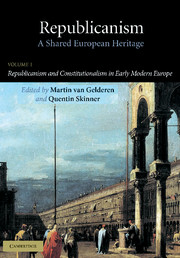Book contents
- Frontmatter
- Contents of Volume I
- Contents of Volume II
- Acknowledgments
- Introduction
- Part I The Rejection of Monarchy
- Part II The Republican Citizen
- Part III The Republican Constitution
- 9 From the Crisis of Civil Culture to the Neapolitan Republic of 1647: Republicanism in Italy between the Sixteenth and Seventeenth Centuries
- 10 Aristotelians, Monarchomachs and Republicans: Sovereignty and respublica mixta in Dutch and German Political Thought, 1580–1650
- 11 Debating the respublica mixta: German and Dutch Political Discourses around 1700
- 12 Classical Foundational Myths of European Republicanism: The Jewish Commonwealth
- 13 Republican Politics in Early Modern Spain: The Castilian and Catalano-Aragonese Traditions
- 14 The Idea of a Republican Constitution in Old Régime France
- 15 Republicanism, Regicide and Republic: The English Experience
- Bibliography
- Contributors
- Index of Names of Persons
- Index of Subjects
13 - Republican Politics in Early Modern Spain: The Castilian and Catalano-Aragonese Traditions
Published online by Cambridge University Press: 15 December 2009
- Frontmatter
- Contents of Volume I
- Contents of Volume II
- Acknowledgments
- Introduction
- Part I The Rejection of Monarchy
- Part II The Republican Citizen
- Part III The Republican Constitution
- 9 From the Crisis of Civil Culture to the Neapolitan Republic of 1647: Republicanism in Italy between the Sixteenth and Seventeenth Centuries
- 10 Aristotelians, Monarchomachs and Republicans: Sovereignty and respublica mixta in Dutch and German Political Thought, 1580–1650
- 11 Debating the respublica mixta: German and Dutch Political Discourses around 1700
- 12 Classical Foundational Myths of European Republicanism: The Jewish Commonwealth
- 13 Republican Politics in Early Modern Spain: The Castilian and Catalano-Aragonese Traditions
- 14 The Idea of a Republican Constitution in Old Régime France
- 15 Republicanism, Regicide and Republic: The English Experience
- Bibliography
- Contributors
- Index of Names of Persons
- Index of Subjects
Summary
In his Relationi universali, that wide-ranging panorama of nations, places and polities of the late sixteenth century, Giovanni Botero remarked how different were the régimes of Castile and Aragon. While in the former the king enjoyed a remarkable degree of authority, in Aragon he found himself strictly limited by provincial laws and privileges, so that people there ‘are living under one king … almost in liberty and in republic’ (Botero 1597–8, Part II, Proemio). According to Botero, such difference was the result, above all, of natural conditions: in plains like those of Castile or Andalusia, people tended to be rather peaceable and prone to accept their prince's will, but high in the mountains and in rough countries men were more individualistic, bellicose and committed to freedom, as was the case of Aragon, Vizcaya and Scotland. But other, expressly political factors were very much at work as well. Ever since Castile and the so-called Crown of Aragon (that is, the kingdoms of Aragon proper and Valencia, and the Principality of Catalonia) had been united under a single crown in 1469, a steady flow of writers and observers, such as Francesco Guicciardini, the Venetian ambassador Leonardo Donà, or the French Huguenot writer François Hotman, among others, pointed to the contrast between the contractual character of the Aragonese régime and the increasingly authoritarian nature of the king's rule in Castile (Gil 1996).
- Type
- Chapter
- Information
- RepublicanismA Shared European Heritage, pp. 263 - 288Publisher: Cambridge University PressPrint publication year: 2002
- 7
- Cited by



